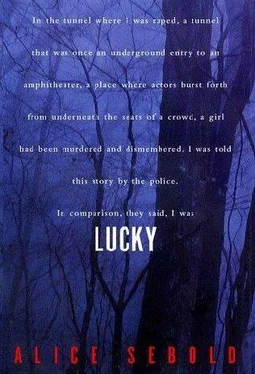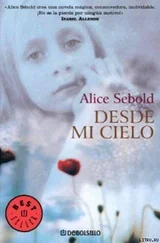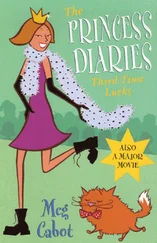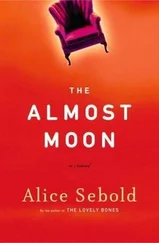I'll never know what the police said to Lila in that room or whether or not she saw her rapist among those men. At the time, I couldn't understand her decision not to pursue it, although I thought I did. The police had a theory that Lila might have been raped out of revenge. They based this on several things. Madison, though in Attica, had friends. He had been given a maximum sentence and would be inside a bare minimum of eight years. The rapist knew my name. Raped her on my bed. Asked after me while he did. He knew my schedule and that I was a waitress at Cosmos. All this could have been evidence of a connection to Madison, or it could just have been the thorough research of a criminal intent on finding his victim alone. I still choose to believe that part of the horror of the crime was in its cruel coincidence. Conspiracy seemed a stretch to me.
Lila didn't want to know. She wanted out of it.
The police interviewed my friends. They went to Cosmos and interviewed the owner and the man who flipped the pizzas inside the front window. But there were other rapes being done with a similar MO to Lila's. If Lila wouldn't prosecute, any link to me was now inconsequential. They had no witness and, with no witness, no case. The police dropped their investigation. Lila went home until January. She gave me a copy of her schedule. I told her teachers why she wouldn't be in attendance at finals. I called her friends.
My life became streamlined, and the fallout began.
I went home for Christmas.
My sister was depressed. She had graduated and won a Fulbright, but was now living at home and working in a garden shop. Her Arabic major was not translating into the job she had hoped for. I went to her room to cheer her up. At some point she said, "Alice, you just don't understand, everything comes so easily for you." I sputtered in my disbelief. A wall went up. I cut her out.
I had nightmares now even more vivid than before. My sporadic journal of those years is full of them. The recurring image is one I'd seen in a documentary of the Holocaust. There are fifty or sixty chalk-white and emaciated dead bodies. Their clothes have been stripped from them. The clip shows a bulldozer rolling them into a deep, open grave, the bodies plunging as a tangled whole. Faces, mouths, skulls with eyes set deep, the minds inside gone to unimaginable lengths in order to have survived. Then this. Darkness, death, filth, and the idea that one person could be struggling, trying to stay alive in there.
I woke up in cold sweats. Sometimes I screamed. I would turn over and lie facing the wall. Enter the next step: Awake now, I consciously played out the intricate plot of my almost death. The rapist was inside the house. He was climbing up the stairs. He knew, on instinct, which steps would betray him by a noise. He was loping down the hall. A breeze came through the front window. No one would think to question it if they were awake in the other rooms. A light scent of another person, someone else in the house, would waft into them, but like one small noise, it would warn no one but me that something was going to happen. I would feel then my door opening, a sense of another presence in the room, the air changed to allow for a human weight. Far away, near my wall, something was breathing my air, stealing my oxygen. My breath would grow shallow and I would make a promise to myself: I would do anything the man wanted. He could rape me and cut me and take off my fingers. He could blind me or maim me. Anything. All I wanted to do was live.
Resolved, I would gather my strength. Why was he waiting like this? I would turn slowly around in the dark. Where the man stood so vividly in my imagination, there was no one, there was the door to my closet. That was all. Then I would turn on the light and check the house, going up to each door and trying the knob, sure it would give and there he would be, standing on the other side and laughing at me. Once or twice the noise I made woke my mother. "Alice?" she would call out.
"Yes, Mom," I said, "it's just me."
"Go back to sleep."
"I will," I said. "I'm just getting something to eat."
Upstairs in my bedroom, I would try to read. Not look at the closet, or, quickly, over to the door.
I never questioned what was happening to me. It all seemed normal. Threat was everywhere. No place or person was safe. My life was different from other people's; it was natural that I behaved differently.
After Christmas, Lila and I tried to make a go of it in Syracuse. I wanted to help her, but I also needed her. I believed in talking. To be with her after dark, I quit Cosmos. This was easy: They didn't want me back. When I had gone to ask about getting day shifts, the owner was distant and standoffish. The man who flipped the pizzas came up after the owner had left.
"Don't you get it?" he said. "The police have been in here asking questions. We don't want you here."
I left in tears and walked blindly into someone.
"Watch where you're going," the man said to me.
It was snowing. I quit the Review. The bus back to the place Lila and I were living broke down a lot. Tess was on leave. I stopped going to poetry readings. One night, I was a little later than usual getting home-it had grown dark-and Steve met me at the doorstep. "Where were you?" he asked. His tone was angry, accusatory.
"We needed food," I said.
"Lila called me because she was scared. She wanted someone to sit with her."
"Thanks for coming over," I said. I was holding a bag of groceries and it was cold.
"You should have been here."
I walked inside and hid my tears.
When Lila said it wasn't working out, that she didn't like the apartment, and she was going to go home for a few weeks and then move in with Mona, a friend she'd recently made, I entered a sort of shock. I thought we'd be in this together. Clones.
"It's just not working, Alice," she said. "I can't talk about it the way you want me to and I feel isolated here."
Steve and Marc were the only two people who had regularly visited the house. Both of them, though scrupulously avoiding each other, were more than willing to sit guard. But they were my friends-my boyfriends, to be exact-and Lila knew it. They were there primarily for me, and to help me out by helping her. She needed to separate. This is clear to me now. Then, I felt betrayed. We went through our record albums and other things that had been common property over our two years together. I cried, and if she wanted something, I gave it to her. I gave her things she didn't ask for. I left possessions behind me to mark my place. Could I ever get back to where I had been? Where was that? A virgin? A freshman in college? Eighteen?
I sometimes think nothing hurt me more than Lila's decision to stop speaking to me. It was a total blackout. She did not return my phone calls when I was finally able to get her new number out of one of her friends. She passed by me on the street and did not speak. I called her name. No response. I blocked her path, she moved around me. If she was with a friend, they indeed looked at me-burning with a hatred I couldn't understand but nonetheless took in.
I moved in with Marc. In four months I would graduate. I stayed inside his apartment for everything but my classes. He drove me everywhere, a willing chauffeur, but mostly he stayed away from me. He was at the architecture studio late into the night; sometimes he slept there. When he was home I asked him to investigate noises, check the locks, to please just hold me.
The week before graduation, I saw Lila again. I was with Steve Sherman. We were in the student mall on Marshall Street. She saw me, I saw her, but she walked right by me.
"I can't believe it," I said to Steve. "We're graduating in a week and she still won't talk to me."
"Do you want to speak to her?"
Читать дальше












